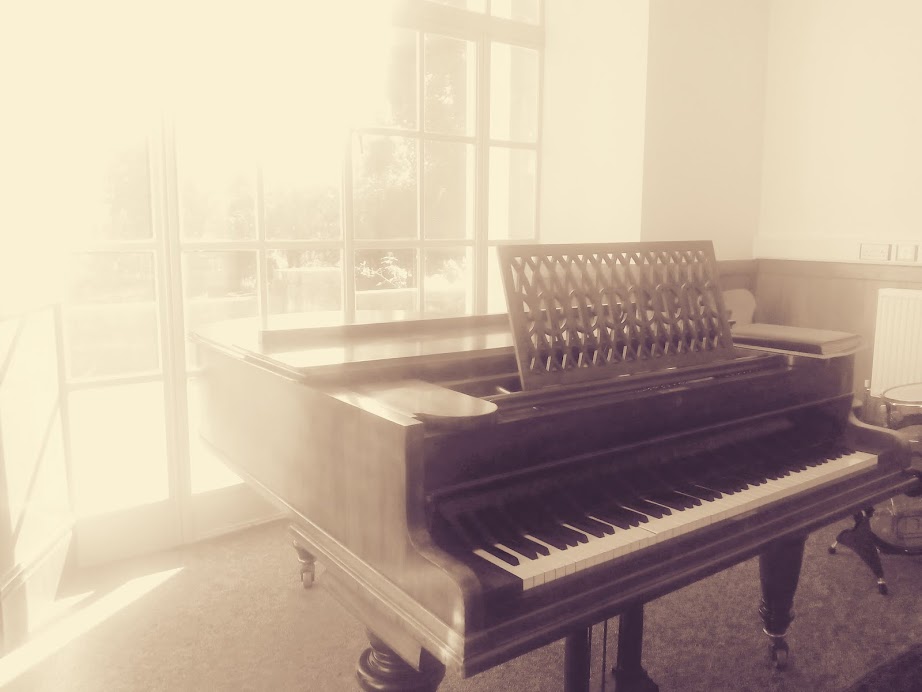Some thoughts on the aesthetics of music
Aesthetics
Nicholas Cook: Music, Performance, Meaning
Hammermeister German Aesthetic tradition
Musical form and the listener:
When showing the
same piece to different listeners and are asked to identify any objective form
of structure.
“… they chose not to be interested in the
objective structure and instead to focus upon its psychological consequences”
“… several listeners would make a comment
at exactly the same time… In such cases, and despite their discrepancies, the
listeners´ responses seem to have shared a certain evolution.”
Thus is it possible, through these
experiments, to generate a piece of art that arouses the same passions in the
soul at an exact same place or bar and reach an equal response? From here, is
it possible to create the perfect art that has a communal feeling and
psychological response?
I believe music to be the highest form of
beauty. Now this comes from Kant´s view that the highest form of beauty is
indeed the human body, for it receives its beauty through its manifestation of
a purpose. But since music comes from man, but at the same time, like Thomas
Mann pointed out, a work of art has its own existence in the mind of the artist
way before its creation, it could be considered as an extension of man.
Therefore a piece of music does have a purpose, even if it is that of existing,
and can educate the aesthetic soul through its unreachable source of pleasure
that keeps fading away.
Even further, if
a work of art is considered as independent from his creator, it has some metaphysical
connotations that make us think of this piece as the free beauty (no concept of
what it is meant to be) and also the adherent beauty (concept of a particular
purpose) of Kant. It does not have any secure concept we can handle, but at the
same time, because it arouses emotions, it serves the purpose of transmitting a
feeling, and in the case of great pieces of music, even changing the state of
the soul.
Music achieves beauty, perfection and sensual
pleasure for Mendelssohn. Now for Kant the aesthetic pleasure of beauty does
not incite desire but frees us all from such longings. When we repeat the same
piece of music over and over again is because we cannot identify the sources of
pleasure, for it has no concept that we can later relate to, and thus we go
back to Baumgarten´s clear and confused cognitions. This cognition is basically
the idea that we know it exists but we cannot list the elements that sum up the
whole. This communal “je ne sais quoi”, this later subjective universality
present in all of us creates a balance between the inner self and the world,
where at some point the same feeling and opinion will eventually combine.
Music performance:
As to Schenker´s
views that during a musical performance there has to be an intelligent connection
within the structure; that say, if I understood correctly, a musical phrase
that is repeated has to have certain connection with the first in order to have
coherence. But Cook´s experiments demonstrate that listeners that heard that
repeated theme in another bar, (talking on psychological terms) clearly felt
that it did not achieve the same effect as the first one did. For it has now
become a matter of spatialization. And it is therefore a paradox to play these
connections but at the same time maintaining the structure of it. Diversity on
playing a piece depends on the amount of detail the performer puts in. But why
should a repeated theme sound exactly the same as the first, if it has a
different meaning in space and memory? A piece of music that is performed is in
constant evolution, it is not a painting, and the sounds are soon extinguished
into the air. To understand the connections is good, for the performer will be
able to demonstrate a sophisticated musical intellect that will surely elevate
music up to a position of pure beauty. But these connections are already in the
music, and therefore need not to be constantly remembered; the physical notes
will do this. The job of the performer is then to provide, like a theorist, a
musical analysis that (which according to Cook, if we link this to musical
performance instead of actual theory) is a satisfying interpretation of the
composition.
Schenker,
influenced by Schopenhauer’s views that music was a means of escaping the
turbulence of the will and attaining a calm awareness of the world of ideas,
said that a true artist must therefore “master all storm and agitation, all
turbulence high and low”, or if not he will be a victim of his own will. This
contemplative awareness of the Idea will allow the artist to look far beyond
what it is mere appearance. For performance means, through the control of his
own will, just like Nature controls and arouses storms or waves, he will
control the reaction his interpretation has over men. Certain serenity in
spirit is always adequate but the total control of feelings might though, with
forced tension, derive in the failure of provoking any spontaneous emotion,
since a music interpretation must, as an ethereal evolution thing that it is,
attain certain levels of spontaneity for it to be a living art that rises and
then dies.




Comentarios
Publicar un comentario